10 Best Office Desk Plants for Improved Productivity
- The 10 Best Office Desk Plants
empty
empty
empty
empty
empty
empty
empty
empty
empty
empty
- Why Desk Plants Are Essential for a Productive Workspace
empty
empty
empty
- Things to Consider When Choosing Desk Plants for Office or Cubicle Spaces
- How to Maintain and Care for Desk Plants: Tips and Tricks for Long-Term Success
- Frequently Asked Questions
- Final Thoughts
In high-stress work environments, finding ways to enhance productivity and well-being is crucial. One simple solution that has gained popularity in recent years is incorporating desk plants into your workspace.
Not only do these plants add a touch of nature to an otherwise sterile environment, but they also offer numerous benefits for your mental and physical health.
In this article, we will explore why desk plants are essential for a productive workspace, the best desk office plants to consider, tips for choosing plants for your office cubicle and how to maintain and care for these plants for long-term success.
The 10 Best Office Desk Plants
When choosing desk plants for office settings, it is important to consider their adaptability to indoor conditions, ease of maintenance and aesthetic appeal.
Here are a few of the best office desk plants that tick all these boxes:
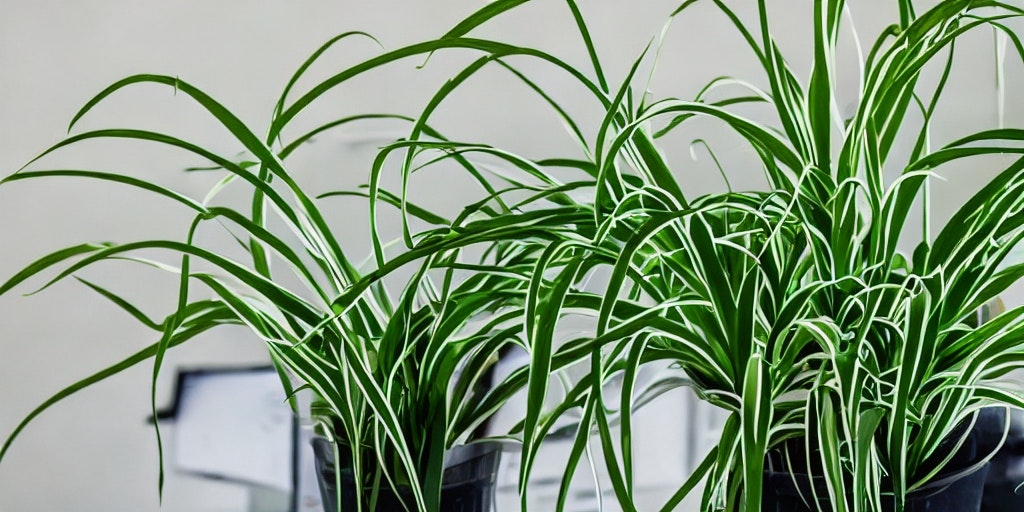
1. Spider Plant (Chlorophytum comosum)
Known for its air-purifying qualities and resilience, the Spider Plant is an excellent choice for any desk. With its long, arching leaves adorned with white stripes, it adds a touch of elegance to your workspace.
Not only does it enhance the visual appeal, but it also helps to improve air quality by removing harmful toxins. Its ability to thrive in a variety of lighting conditions makes it a versatile option for any office environment.
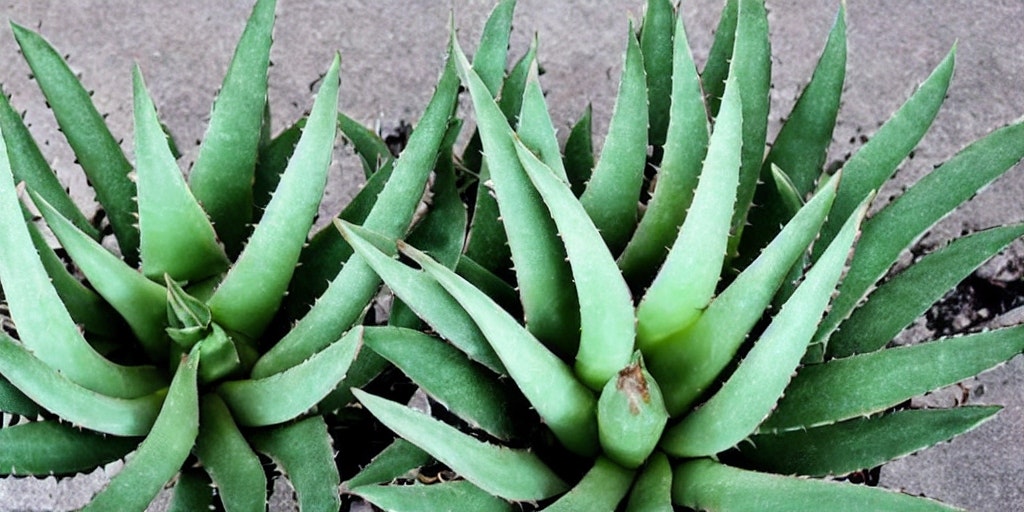
2. Aloe Vera (Aloe barbadensis miller)
If you're looking for a low-maintenance desk plant that offers more than just aesthetic appeal, Aloe Vera is the perfect choice.
This succulent plant requires minimal care and can withstand long periods without water. Not only does it add a refreshing touch of green to your workspace, but it also doubles as a natural remedy for minor burns.
Simply break off a leaf and apply the soothing gel to the affected area for instant relief.

3. Peace Lily (Spathiphyllum)
For those working in spaces with low light conditions, the Peace Lily is an ideal choice.
With its glossy, dark green leaves and elegant white flowers, it brings a sense of tranquility to your desk. Apart from its aesthetic appeal, the Peace Lily also helps to reduce mold spores in the air, making it a great option for individuals with allergies or respiratory sensitivities.
With minimal care requirements, it is a hassle-free plant that thrives in indoor environments.

4. Golden Pothos (Epipremnum aureum)
If you're looking to add a touch of greenery to your workspace without taking up too much space, the Golden Pothos is the perfect solution.
This trailing vine plant features heart-shaped leaves in shades of green and yellow, adding a pop of color to your desk. Its cascading growth habit allows it to be displayed in hanging baskets or placed on shelves.
The Golden Pothos is known for its ability to purify the air by removing toxins, making it a valuable addition to any office.
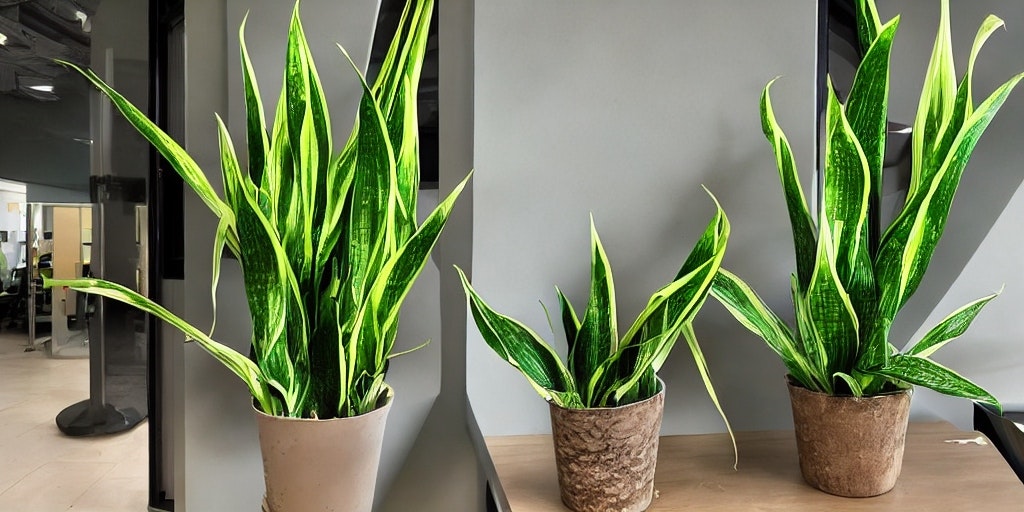
5. Snake Plant (Sansevieria trifasciata)
The snake plant, also known as mother-in-law's tongue, is a hardy and versatile plant that thrives in low light conditions, making it perfect for offices with limited sunlight.
Its long, sword-shaped leaves not only add a touch of greenery but also efficiently remove toxins such as formaldehyde, benzene, and trichloroethylene from the air.
By improving indoor air quality, the snake plant creates a healthier environment for employees, reducing the risk of headaches, respiratory issues, and fatigue, thereby enhancing productivity and wellbeing.
With its low maintenance requirements and drought tolerance, it's an ideal choice for busy workplaces seeking to incorporate natural elements into their design.
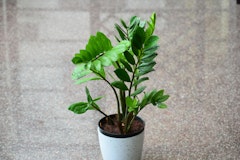
6. ZZ Plant (Zamioculcas zamiifolia)
The ZZ plant is prized for its glossy, dark green leaves and its ability to thrive in low light conditions, making it an excellent choice for offices with limited natural light.
This hardy plant is highly tolerant of neglect and requires minimal maintenance, making it perfect for busy workplaces. Beyond its aesthetic appeal, the ZZ plant is an efficient air purifier, removing toxins such as xylene, toluene, and benzene from the air.
Additionally, its upright growth habit and compact size make it suitable for desks, shelves, or any other available space within the office, providing flexibility in design and placement.

7. Rubber Plant (Ficus elastica)
The rubber plant, with its large, glossy leaves, adds a touch of tropical elegance to any office space.
This hardy plant is highly adaptable and can thrive in a variety of indoor conditions, including low light and fluctuating temperatures. Beyond its aesthetic appeal, rubber plants are efficient air purifiers, removing toxins such as formaldehyde and benzene from the air.
Additionally, their robust growth habit and tolerance of neglect make them ideal for busy workplaces where minimal maintenance is desired. With proper care, rubber plants can grow into impressive specimens, providing long-lasting beauty and benefits to the office environment.
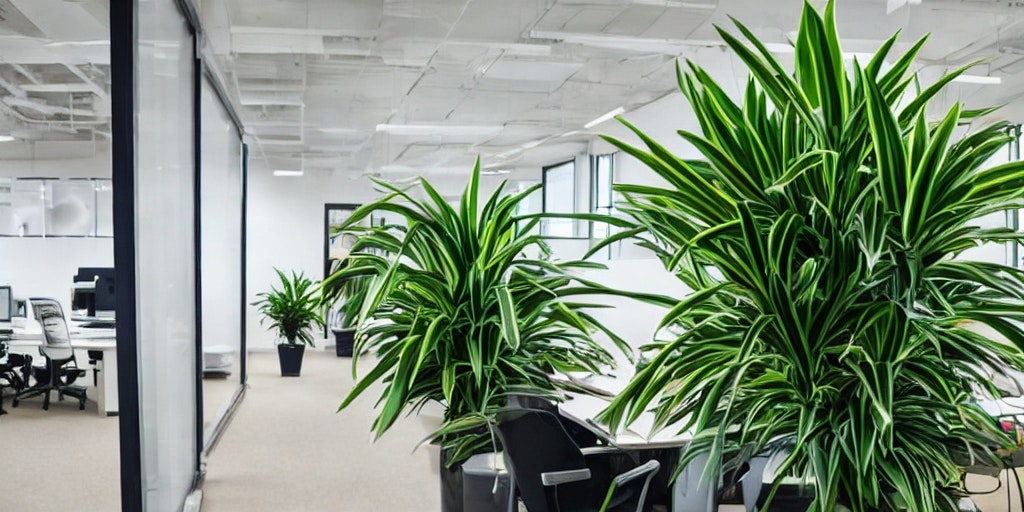
8. Dracaena (Dracaena spp.)
Dracaena plants encompass a wide variety of species, each with its own unique appearance and air-purifying capabilities, making them versatile additions to any office space.
These plants thrive in a variety of lighting conditions, from low to bright indirect light, and are relatively low maintenance, making them suitable for busy workplaces.
Beyond their aesthetic appeal, dracaena plants are efficient air purifiers, removing toxins such as formaldehyde, benzene, and trichloroethylene from the air.
Additionally, their varied shapes, sizes, and colors provide opportunities for creative expression and design within the office space.
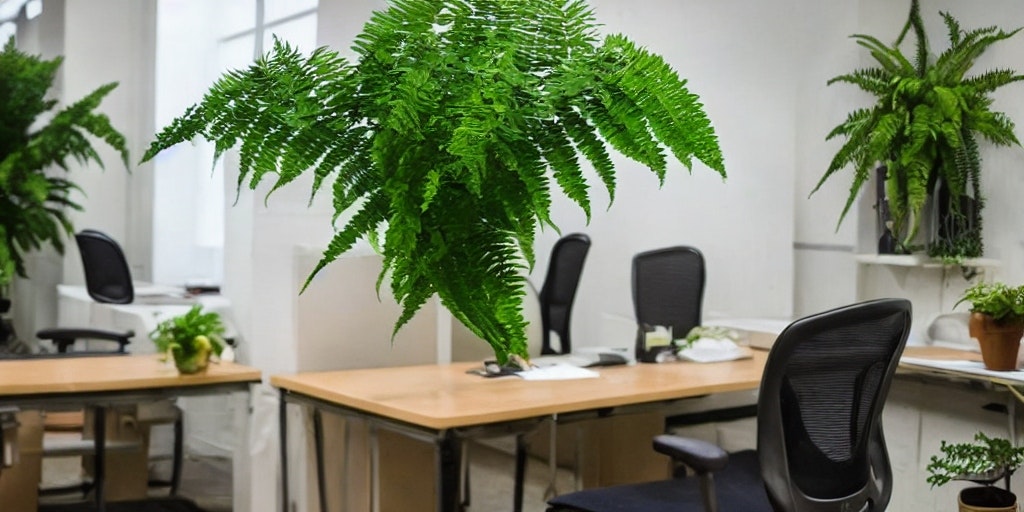
9. Boston Fern (Nephrolepis exaltata)
The Boston fern is prized for its lush, feathery fronds and its ability to thrive in high humidity environments, making it an excellent choice for offices with dry indoor air.
This versatile plant is highly adaptable and can tolerate a range of lighting conditions, from bright indirect light to partial shade.
Beyond its aesthetic appeal, Boston ferns are efficient air purifiers, removing toxins such as formaldehyde and xylene from the air. Additionally, their trailing fronds add a touch of natural beauty and softness to the office space, creating a more inviting and welcoming atmosphere.

10. Chinese Evergreen (Aglaonema)
Chinese evergreens are prized for their attractive foliage and their ability to thrive in low light conditions. These hardy plants are highly adaptable and can tolerate a range of indoor conditions, including fluctuating temperatures and low humidity.
Beyond their aesthetic appeal, Chinese evergreens are efficient air purifiers, removing toxins such as formaldehyde and benzene from the air.
Additionally, their varied foliage patterns and colors provide opportunities for creative expression and design within the office space, adding visual interest and enhancing overall aesthetic appeal.
By incorporating these best office desk plants into your workspace, you can create a more inviting and productive environment. Not only will they enhance the visual appeal of your desk, but they will also contribute to improved air quality and overall well-being.
Why Desk Plants Are Essential for a Productive Workspace
Creating a productive workspace involves more than just having the right equipment and tools. It also includes ensuring a positive and conducive environment for your mental wellbeing.
Reducing Stress
Research has shown that exposure to nature, even in the form of indoor plants, can significantly reduce stress levels.
The presence of greenery has a calming effect on the mind and helps to create a sense of tranquility in the workspace, making it easier to focus and stay motivated.
Improving Air Quality
Furthermore, plants are natural air purifiers. They absorb carbon dioxide and release oxygen, helping to improve indoor air quality. This fresh air supply can enhance brain function, leading to better concentration and cognitive performance.
Additionally, certain desk plants, such as the snake plant and pothos, have been found to remove harmful toxins and pollutants from the air, further contributing to a healthier work environment.
Boosting Happiness and Satisfaction
Desk plants have been found to increase overall happiness and satisfaction in the workplace. The sight of greenery and the act of nurturing plants can evoke positive emotions and a sense of fulfillment.
Taking care of a living organism provides a sense of purpose and responsibility, fostering a deeper connection to your workspace.
This emotional bond with your desk plants creates a more enjoyable and fulfilling work environment, ultimately boosting your productivity and job satisfaction.
Things to Consider When Choosing Desk Plants for Office or Cubicle Spaces
When selecting desk plants for office or cubicle spaces, several factors should be taken into consideration to ensure the chosen plants thrive and positively contribute to the work environment:
-
Lighting Conditions: Assess the amount of natural light available in the workspace. Choose plants that match the lighting conditions, opting for low-light varieties like snake plants or ZZ plants for dimly lit areas, and selecting ferns or peace lilies for spaces with brighter light.
-
Space Availability: Consider the size of the desk or cubicle and the available surface area for placing plants. Opt for compact plants like succulents or small ferns for limited spaces, while larger desks may accommodate taller plants like rubber trees or Dracaenas.
-
Maintenance Requirements: Evaluate the amount of time and effort available for plant care. Select low-maintenance plants such as pothos or spider plants for busy individuals, while those with more time may enjoy caring for higher-maintenance varieties like orchids or bonsai trees.
-
Air Quality Improvement: Choose plants known for their air-purifying properties to enhance indoor air quality and promote a healthier workspace. Consider options like peace lilies, snake plants, or spider plants, which efficiently remove toxins from the air.
-
Allergies and Sensitivities: Take into account any allergies or sensitivities among office occupants when selecting plants. Opt for hypoallergenic varieties like ferns or palms to minimize the risk of triggering allergic reactions.
-
Aesthetic Appeal: Consider the desired aesthetic and ambiance of the workspace. Choose plants with attractive foliage and textures that complement the office decor and contribute to a visually appealing environment.
-
Ease of Propagation: Select plants that can easily propagate to expand the greenery within the workspace or share with colleagues. Options like spider plants or pothos are known for their ability to produce offshoots or "babies," making them excellent choices for propagation.
-
Office Policies: Familiarize yourself with any office policies or guidelines regarding the presence of plants in the workspace. Ensure chosen plants adhere to any restrictions or limitations set by the employer.
By carefully considering these factors, individuals can select desk plants that not only beautify their workspace but also promote productivity, well-being, and a healthier indoor environment.
How to Maintain and Care for Desk Plants: Tips and Tricks for Long-Term Success
To ensure the longevity and health of your desk plants, follow these care tips:
Step 1. Watering
When it comes to watering your desk plants, it's important to strike the right balance. Overwatering can lead to root rot and other issues, while underwatering can cause the plants to wither and die.
To determine if your plants need watering, gently stick your finger into the soil up to the first knuckle. If the soil feels dry, it's time to water. If it's still moist, hold off on watering for a few more days.
Remember, different plants have different water requirements, so it's essential to research the specific needs of each plant you have.
Step 2. Lighting
Most plants thrive in bright, indirect light. If your workspace lacks natural light, consider using artificial grow lights to provide the necessary light spectrum for optimal growth.
Place the lights at an appropriate distance from the plants, ensuring they receive the right amount of light without being scorched or deprived.
Step 3. Pruning
Regular pruning is essential for maintaining the health and appearance of your desk plants. By removing dead or yellowing leaves, you not only improve the overall aesthetic but also stimulate new growth.
Use clean, sharp pruning shears to make clean cuts, and be mindful not to remove too much foliage at once, as this can stress the plant.
Step 4. Fertilizing
In addition to proper watering, lighting and pruning, fertilizing can help provide your desk plants with the necessary nutrients for healthy growth.
Choose a balanced houseplant fertilizer and follow the instructions carefully to avoid overfertilizing, which can lead to nutrient burn.
Fertilize your plants during their active growing season, typically in spring and summer, and reduce or stop fertilizing during the dormant period in fall and winter.
Remember, caring for desk plants is not just a one-time task but an ongoing commitment. Regularly monitor their condition, check for pests and adjust their care routine as needed. With proper attention and care, your desk plants will thrive, creating a vibrant and refreshing atmosphere in your workspace.
Yes, research has found that being in the presence of plants can help reduce stress and anxiety, improve mood and increase focus and concentration. Desk plants can also improve air quality by absorbing harmful pollutants and releasing oxygen. This can create a healthier and more refreshing atmosphere.
The number of desk plants you should have depends on the size of your workspace, the amount of natural light available and your personal preference. They shouldn’t overcrowd or obstruct your work area. Start with a few and gradually add more if desired, experimenting with different types, sizes and arrangements.
Yes, some pet-friendly desk plants include the Boston Fern, Areca Palm and Christmas Cactus. While these plants are generally considered safe for pets, it is always recommended to research the toxicity of any plant you bring into your workspace. Some pets may have specific sensitivities or allergies, so be cautious.
Some lucky plants for office desk environments include the snake plant, lucky bamboo, peace lily and money plant. These plants are believed to bring good luck, positivity and prosperity while also improving indoor air quality and creating a calming environment conducive to productivity.
Some suitable flowers for office desk settings include orchids, African violets and succulents like echeverias. These flowers add a touch of color and freshness to your workspace, boosting mood and productivity. Opt for low-maintenance varieties to ensure they thrive in an office environment with minimal care.
Ideal small plants for office desk settings include succulents such as jade plants, cacti and Haworthias. Other options are spider plants, pothos and mini snake plants. These plants require minimal space and maintenance, purify the air and enhance productivity by creating a calming atmosphere in your workspace.
Final Thoughts
Desk plants are not merely decorative items; they offer tangible benefits for productivity and well-being in the workplace.
Having plants in the office can improve air quality, which can lead to better respiratory health and a decrease in symptoms like headaches and fatigue. In addition, studies have shown that being surrounded by nature, even in the form of indoor plants, can boost mood, reduce stress and improve cognitive function.
Furthermore, desk plants can create tranquility and calmness in an otherwise hectic work environment. The presence of greenery has been linked to lower levels of anxiety and improved overall well-being. Taking a moment to admire and connect with nature can provide a much-needed mental break during a busy day, allowing you to recharge and refocus.
Lastly, plants can serve as conversation starters and help foster a sense of community and connection among coworkers. Sharing tips on plant care or discussing the benefits of having greenery in the office can create a more collaborative and friendly atmosphere.
So, whether you want to improve your own well-being and productivity or create a more inviting and pleasant work environment for your team, desk plants are a simple yet effective solution.



